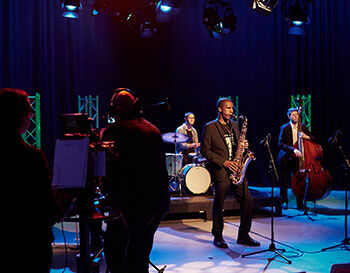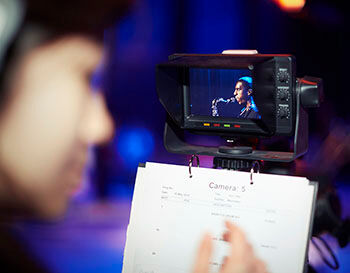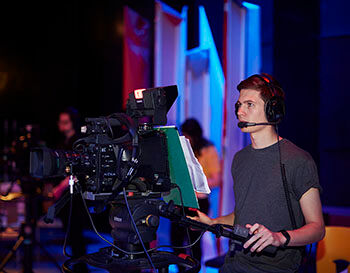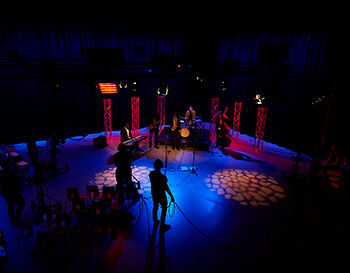University News Last updated 29 May 2018

A golden era of music television has been faithfully recreated at Birmingham City University, as part of a major new research project looking at jazz broadcasting in the 1960s.
As well as encompassing archival research and interviews with former production staff, the study involved transforming the University’s main TV studio to simulate how a jazz programme was made. This included scrutinising the technical decisions faced by television crews and improvising musicians at each stage of producing such a broadcast.
Following months of planning, on Tuesday 22 May, Birmingham City University’s TV Studio A was transformed to evoke the aesthetics of a 1960s BBC jazz programme. Led by director Mark Kershaw, and featuring a crew of former BBC employees and current Birmingham City University students, the team utilised cutting edge facilities in the University’s £62 million Parkside Building to precisely record the role of improvisation in the relationship between a television crew, their equipment and a contemporary working jazz group.
‘Jazz 1080’
In a loving homage to the legendary BBC jazz concert show, ‘Jazz 625’ – so titled because the newly launched BBC  Two was broadcasting on 625-UHF lines (the HD of the time) – the Birmingham City University production has been named ‘Jazz 1080’, reflecting the technological leap in broadcasting since the 1960s. In order to realise this modern incarnation, the researchers and crew worked from original documentation sourced from the BBC Written Archive in Caversham.
Two was broadcasting on 625-UHF lines (the HD of the time) – the Birmingham City University production has been named ‘Jazz 1080’, reflecting the technological leap in broadcasting since the 1960s. In order to realise this modern incarnation, the researchers and crew worked from original documentation sourced from the BBC Written Archive in Caversham.
Presented by Birmingham rapper Juice Aleem, the 50-minute programme featured performances by rising stars from the West Midlands jazz scene. Xhosa Cole (tenor saxophone), Lee Griffiths (alto saxophone), James Owston (double bass), Euan Palmer (drums) and Eyituoyo Awala (piano) – known as The Xhosa Cole Quintet – treated the studio audience to classic works by renowned artists such as Dexter Gordon, Freddie Hubbard and Dizzy Gillespie.
The ambitious project came to fruition as a result of Dr Nicolas Pillai, based in the institution’s Birmingham School of Media, who secured a prestigious Early Career Research Leadership Fellowship from the Arts and Humanities Research Council (AHRC).
He said the funding, worth nearly £170,000, is allowing him to look ahead to the future of music television, as well as considering its past:
Student experience
As well as giving Dr Pillai insight into the production processes of television, the project has offered Birmingham City University students the opportunity to work alongside experienced professionals who instruct at the BBC Wood Norton training academy.
Across two days, undergraduates from Birmingham School of Media were taught the disciplines of working on a multi-camera set and the intricacies of sound recording, studio lighting and camera operation.
Understanding production techniques of the past will give these young media professionals an edge as they embark upon their careers, Dr Pillai suggested:
“For me, the most enjoyable aspect of the shoot was seeing our students leap into the unknown with such enthusiasm and energy. We asked a lot of them and they delivered with great professionalism. Our finished programme is a testament to their potential, as well as being a record of an exciting moment in the Birmingham jazz scene, personified by The Xhosa Cole Quintet.
“Ultimately, ‘Jazz 1080’ is a tribute to a way of working within light entertainment at the BBC. My hope is that our programme will turn the spotlight back onto a wonderful period of music television, when visionary producers like Terry Henebery changed the way that this country thought about jazz.”
Research
‘Jazz 1080’ is one output of the larger AHRC-funded research project – ‘Jazz on BBC-TV 1960-1969’ – and is being facilitated by the Jazz Research cluster at Birmingham City University, which is led by Professors Nicholas Gebhardt and Tony Whyton, as well as Dr Nicolas Pillai. 
Although only five years old, the cluster boasts more than 40 members, including 10 jazz researchers from across Birmingham School of Media and Royal Birmingham Conservatoire, eight doctoral students and leaders of the regional jazz community, as well as additional academic partners at University of Warwick, University of Amsterdam (Netherlands) and University of Music and the Performing Arts Graz (Austria).
Furthermore, the University’s new £57 million Royal Birmingham Conservatoire is home to Eastside Jazz Club, the first permanent jazz space in any UK conservatoire. In 2017, the Conservatoire launched its big band Ellington Orchestra, who are a regular fixture in the club.
Images: Ian Davies